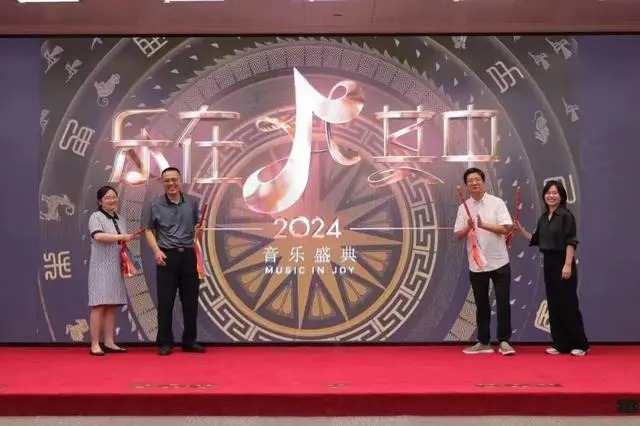A live television show featuring musical performances showcasing ethnic elements from home and abroad has won many fans and aroused young viewers’ interest in different ethnic music cultures and instruments.
In the first episode of Music in joywhich was broadcast on Friday, six Chinese singing couples and two international singing couples presented various ethnic groups from China as well as music from Brazil and Russia. All of the songs were original compositions and the audience was impressed by the singers’ skills and the versatility of the performers.
The performances involved ethnic minority groups, musical instruments and clothing from the Xinjiang Uygur and Xizang Autonomous Regions and Yunnan Province. Chinese singer Yang Ge and Russian singer Mariya Poezzhaeva sang a duet in Russian.
Brazilian singer Alexia Evellyn impressed the Chinese audience with a song called “Hold on,” which is about the freedom and wild beauty of the South American country.
The first of three episodes of the show aired on Hunan Satellite TV and Mango TV on Friday. Hunan Satellite TV said the program was No. 1 among all programs broadcast by the province’s TV stations at the same time, and it had also been viewed 880 million times on social media platforms on Friday.
As this year marks the 50th anniversary of the establishment of diplomatic relations between China and Brazil, the Latin America and Caribbean Department of the Brazilian Foreign Ministry praised Evellyn’s appearance on its microblogging account Sina Weibo.
Evellyn said she learned about local folk culture and enjoyed the beautiful scenery, culture and food during a recent trip to Zhangjiajie in Hunan Province.
She said she was excited to be on stage and share music with such talented musicians, and she wanted to express courage and confidence through her music.
Veteran singer Gong Linna gave a performance in the Chaoshan dialect of Guangdong Province, expressing the feelings of people who miss their hometowns.
Young people have become fans of traditional Chinese music and culture, leading to greater exposure of ethnic music, a genre that reminds people of their roots, she said.
Gong said she has visited many regions inhabited by ethnic minorities and learned the singing techniques and styles of the locals, which has inspired her artistic innovation and confidence.
She encouraged more musicians to visit different places in China and hear how local people sing, live and fall in love. This experience can inspire their music and prolong their musical careers, she said.
“When we talk about foreign music, we often only talk about music from the United States or Europe,” she said. “In fact, there are important music genres from India, Russia, Central Asia and Latin America. The exchange of different music from China and abroad can forge friendships.”
Singer Ayanga, who belongs to the Mongolian ethnic group, gave a performance in Mandarin and Mongolian and performed a Mongolian dance during the intermission.
He said there are talented musicians and inspiring pieces of music that have been passed down in China for thousands of years and will continue to exist for thousands of years to come.
“Music is our roots and we have such a treasure that we must make it accessible to a young and wider audience,” he said.
Huang Xiaoying, 23, a doctoral student from Wuhan, Hubei province, watched the live performance in the studio. She said that although the singers came from different ethnic groups and cultures, their songs all reflected on similar themes – the world, nature and humanity.
“Ethnic music is not only a representation of a certain ethnic group, but also of the whole world,” Huang said. It belongs to different nations and cultures, but can cross national and cultural boundaries, she said.
Zhao Xincheng, 21, was also in the show’s live audience on Friday. He said he was most impressed by the performances of Evellyn and Yunggiema, a member of the Monba ethnic group from Xizang.
Although they sang in different languages, their music followed similar themes and called on people to love one another and work for world peace, he said.
“Ethnic music simply has the power to overcome language barriers and touch people’s hearts,” Zhao said.

